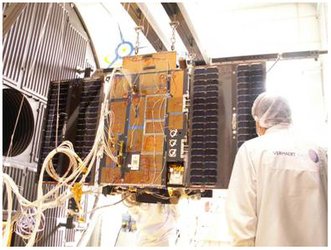Proba-2: Technology demonstrations
Proba-2 will demonstrate in-orbit a large number of new technologies. These can be split into two groups: those which are an integral part of the spacecraft platform (described on the Proba-2: Spacecraft page) and those which are for demonstration purposes and are not mission critical (described below).
Proba-2 will also carry a scientific payload of four instruments: two complementary solar observation instruments (LYRA and SWAP) and two plasma measurement instruments (TPMU and DSLP). These are described on the Proba-2: Science payload page.
Digital sun sensor
The digital Sun sensor on Proba-2 belongs to a new generation of miniaturised attitude sensors applying new technology, such as active pixel sensors (APS). It utilises a sensor that was developed for ESA-ESTEC in the frame of the ARTES-5 program for telecommunication equipment technology development. If the demonstration is successful, the sensor can be incorporated into the attitude control loop of Proba-2.
The digital Sun sensor is being developed by TNO (NL).
BepiColombo star tracker
In the frame of the BepiColombo mission to Mercury and the Solar Orbiter mission, a demonstration model of the miniaturized Star Tracker has been developed. Proba-2 will demonstrate and characterise this model in orbit in support of these and other future missions. The star tracker exploits recent technology advances in micro- mechanical devices, active pixel arrays and folded optics.
The star tracker is being developed by Galileo Avionica (IT).
Exploration Camera (X-CAM)
The X-CAM camera, which includes a CCD detector, an analogue-digital converter and mass memory, provides a fixed-focus, wide-angle view of about 120º.
X-CAM is being developed by Space-X (CH).
Fibre sensor demonstrator (FSD)
The FSD will demonstrate the use of fibre sensors for the measurement of temperature and pressure. It contains 6 sensors to measure the temperature at different locations in the propulsion system and in the spacecraft as well as the xenon tank pressure.
The FSD is being developed by MPB Communications Inc. (CND).
Science grade vector field magnetometer (SGVM)
The SGVM is an advanced flux-gate magnetometer which delivers in real time the components of the magnetic field with a very high precision. The instrument is mainly intended for scientific use, but can also be used by the spacecraft attitude control systems.
SGVM is being developed by DTU (DK).
Global positioning system (GPS)
Proba-2 will demonstrate for the first time a dual frequency GPS space receiver (L1 and L2C reception) in orbit. This GPS receiver will be operated on Proba-2 completely independently from the low-power GPS receiver which is used for the nominal control of the spacecraft.
The GPS receiver is being developed by Alcatel (FR).
Xenon propulsion system with resistojet thruster
The resistojet experiment onboard Proba-2 will characterize the performance of an already flight proven resistojet thruster, but now using xenon as the propellant. The utilization of xenon has some advantages:
- technological interest (for eventual use in combination with other types of electrical propulsion)
- no liquefaction under the PROBA 2 conditions, avoiding any disturbances due to sloshing
- low risk of contamination of the sensitive ultra-violet optics of the science payloads
Although propulsion is not needed to support the scientific part of the Proba-2 mission, it will be used to compensate the orbital decay that will occur throughout the mission.
The xenon propulsion system is being developed by SSTL (UK).
Cool gas generator experiment (COGEX)
COGEX will re-pressurize the xenon propellant tank with nitrogen generated from solid state cartridges. Four cartridges are accommodated to demonstrate in-orbit operation and characterize the effect of the mission duration on its functioning and performance.
COGEX is being developed by Bradford Engineering and TNO (NL).




